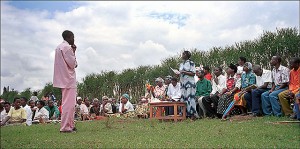Earlier this month the last of the Rwandan Gacaca (‘Lawn’) courts closed down.

These communal tribunals, chaired by a council of elders in each community, have processed over 100,000 cases pertaining to the Rwandan genocide.
Since 2001, almost all of the civilian cases have been heard in Gacaca courts, while the International Criminal Tribunal for Rwanda has dealt with abuses committed by the military and other high-ranking officials.
The closure of this judicial chapter has prompted a number of retrospectives from supporters and detractors alike.
If you are unfamiliar with the Gacaca system, read the first two pages of this report for a very evocative depiction of a typical proceeding.
Imagine 9 village leaders elected for their ‘moral character’ arrayed in the village square.
A proposed genocidaire is then marched in front of the elders, with the entire community looking on.
The perpetrator confesses to one or several acts of violence, and then the elders query the crowd to see if anyone else has any other charges to bring against the accused.
After the community has weighed in, the elders determine the punishment and the matter is closed.
These courts were empowered to level sentences of up to life in prison.
My “made in America” mind immediately jumps to all the possible ways that this arrangement could go wrong, but the more I think about it, the less confident I feel condemning the Gacaca system.
Sure- the opportunities for local corruption are huge.
Witness intimidation and other forms of extra-judicial pressure, along with highly variable sentencing, probably led to many miscarriages of justice.
Read this Human Rights Watch report for a really negative view of the whole affair.
And yes, I think it is a rather horrid idea to deal with sexual violence in such a public manner.
However – how else could a country process hundreds of thousands of victims and hundreds of thousands of perpetrators?
Also, as flawed as this process might have been, the public airing of accusations seems to have had a cathartic effect on Rwandan society.
This largely laudatory article points specifically to the fact that many relatives were able to learn where their relatives were buried—a long festering obstacle to reconciliation.
When Americans use the word justice in an international context they really mean western justice.
Western countries also financially underwrite many of the international community’s judicial institutions, thus further entrenching one form of justice as the international norm.
However, that particular system’s focus on free will, individual responsibility and retribution jive poorly with communal conflicts and systemic abuse of any particular group. (Just think of how poorly the U.S. justice system has dealt with racial issues over the last century.)
The truth and reconciliation model allows more people to participate, lends itself to resolving communal conflicts as opposed to punishing aberrant individuals, and, on a more mundane level, is financially and logistically feasible in a country with hundreds of thousands of cases and very limited legal resources
Gacaca courts were far from perfect, but I am glad that 130,000 ex-combatants are no longer rotting in jail waiting for a trial, and hundreds of thousands of victims have been able to yell their accusations out in public.